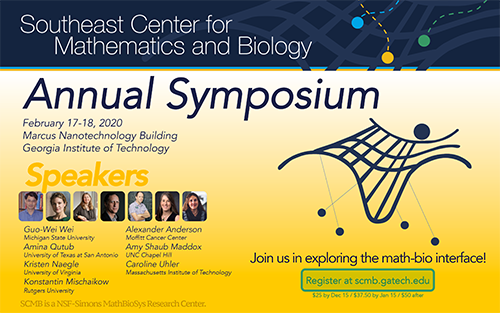
- This event has passed.
Southeast Center for Mathematics and Biology 2020 Annual Symposium
February 17, 2020 - February 18, 2020

The SCMB Annual Symposium is a forum to exchange ideas between the broader mathematics and biosystems communities. There will be plenary talks from mathematicians and biologists, organized in complementary pairs, as well as a a public lecture. These will be offered at a colloquium level of detail with an emphasis on engaging the full range of mathematical and biological researchers. A poster session will facilitate discussions among participants in a less formal setting. This will encourage interactions which may then nucleate new research collaborations at the math-bio interface. The overall goal of the SCMB Symposium is not just to highlight the many challenges and opportunities at the math-bio interface, but to create a vibrant community advancing the mathematics of complex biological systems.
SCMB has funding to partially support participants for travel up to $450.00. Priority in allocation will be given to graduate students, postdocs, and junior researchers, including tenure-track faculty, and especially to those who are presenting posters. If funding allows, we may be able to fund additional participants. For more information, see scmb.gatech.edu/symposium/additional-information.
Confirmed Speakers
- Guo-Wei Wei (Michigan State University), “Mathematical Al for drug discovery”
- Amina Qutub (University of Texas at San Antonio), “Designer Neural Networks: how Daily Habits Change our Brain Cells”
- Kristen Naegle (University of Virginia), “All models are wrong – How we make them more useful”
- Konstantin Mischaikow (Rutgers University) “The DSGRN Database for Dynamics of Gene Regulatory Networks”
- Alexander Anderson (Moffitt Cancer Center), “Evolutionary therapy for metastatic cancer”
- Amy Shaub Maddox (UNC Chapel Hill), “Contractile oscillations suggest mechanisms of cytoskeletal remodeling in cytokinesis”
- Caroline Uhler (Massachusetts Institute of Technology), “From Causal Inference to Autoencoders and Gene Regulation”